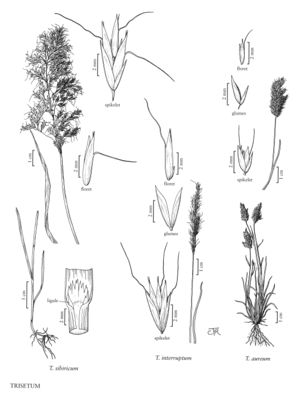Difference between revisions of "Trisetum sibiricum"
FNA>Volume Importer |
imported>Volume Importer |
||
| (6 intermediate revisions by 2 users not shown) | |||
| Line 26: | Line 26: | ||
-->{{#Taxon: | -->{{#Taxon: | ||
name=Trisetum sibiricum | name=Trisetum sibiricum | ||
| − | |||
|authority=Rupr. | |authority=Rupr. | ||
|rank=species | |rank=species | ||
| Line 33: | Line 32: | ||
|basionyms= | |basionyms= | ||
|family=Poaceae | |family=Poaceae | ||
| + | |illustrator=Cindy Roché | ||
| + | |illustration copyright=Utah State University | ||
|distribution=Alaska;Yukon | |distribution=Alaska;Yukon | ||
|reference=None | |reference=None | ||
| Line 38: | Line 39: | ||
|publication year= | |publication year= | ||
|special status= | |special status= | ||
| − | |source xml=https:// | + | |source xml=https://bitbucket.org/aafc-mbb/fna-data-curation/src/200273ad09963decb8fc72550212de541d86569d/coarse_grained_fna_xml/V24/V24_1063.xml |
|subfamily=Poaceae subfam. Pooideae | |subfamily=Poaceae subfam. Pooideae | ||
|tribe=Poaceae tribe Poeae | |tribe=Poaceae tribe Poeae | ||
Latest revision as of 16:21, 11 May 2021
Plants perennial, sometimes with both fertile and sterile shoots; rhizomatous. Culms 15-40(65) cm, solitary, decumbent; nodes glabrous. Sheaths smooth; ligules 1-3.5 mm, truncate or slightly higher in the center, often lacerate; blades 8-15(24) cm long, 2.5-7 mm wide, flat, erect or ascending, stiff or lax, smooth. Panicles 2-12(16) cm long, (1)2-3(6) cm wide, ovate-spicate, sometimes basally interrupted, yellowish brown, often mottled, shiny; branches usually 0.1-2(4) cm, appressed-ascending, the spikelets distal; disarticulation above the glumes, beneath the florets. Spikelets 5-8 mm, subsessile or pedicellate, pedicels to 4 mm, with 2(3) florets; rachilla internodes usually 1-2 mm; rachilla hairs 0.5-1 mm, often curly and tangled. Glumes lanceolate, glabrous; lower glumes 3-4.5 mm; upper glumes 5-8 mm; callus hairs about 0.5 mm; lemmas 4.5-7 mm, glabrous, apices minutely bifid, teeth shorter than 1 mm, awned, awns 4-10+ mm, arising from the upper 1/3, exceeding the lemma apices, flexuous, curved, or bent and twisted basally; paleas subequal to or as long as the lemmas; anthers 2-3.5 mm. Caryopses 1-2 mm, ovate, smooth, brown. 2n = 14, 28.
Discussion
Trisetum sibiricum grows on coastal beaches and creek banks, and in moist meadows and open forests, from sea level to 300+ m. It is often abundant and has significant value as a pasture plant. Circumpolar in distribution, in the Flora region it grows in Alaska and the Yukon Territory. Most North American plants belong to Trisetum sibiricum subsp. litorale Rupr. ex Roshev., having culms 15-30 cm tall, leaf blades 2.5-4 mm wide, panicles 3-5 cm long and 2-3 cm wide, branches to 2 cm long, and lemma awns 5-8 mm long. Trisetum sibiricum Rupr. subsp. sibiricum occurs in the Yukon Territory and Eurasia. It differs from T. spicatum in its smooth culms and leaves, and its broad, less dense panicles.
Selected References
None.
